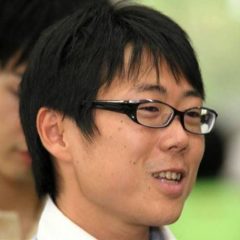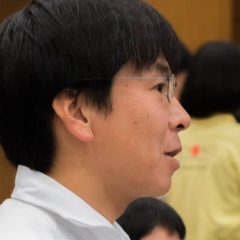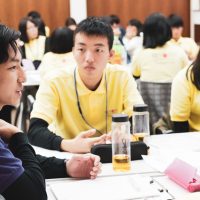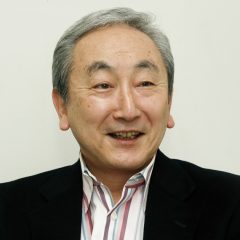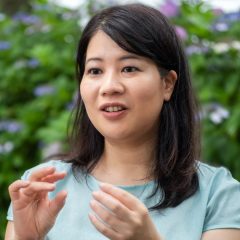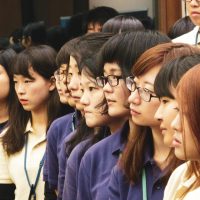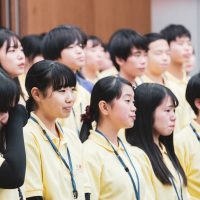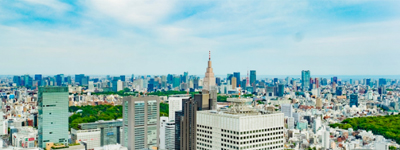Youths who have overcome adversities will bring about new values to a homogeneous society
Ryohei Nakagawa
Associate Professor, Faculty of Global Management Studies, The University of Nagano

“I was a butterfly floating in nothingness”
Held at gunpoint, Anselme was in the face of death. One day in the beginning of the nineties when the Democratic Republic of the Congo was still called Zaire, two soldiers had barged into the student dormitory rooms in Kinshasa, the capital. The dictator in power then was trying to purge the educated class, obsessed by the idea that his power was at stake. “If I am going to die anyways,” Anselme thought, “I’d rather die myself than be shot by these soldiers.” He broke the glass window of his room and jumped out from the third floor. Ironically, he survived, landing on a cushion of his fellow students’ dead bodies lying under the windows. Holding back his pain and pretending he was dead, Anselme waited until dusk then escaped the campus. He rode up the Congo River hiding in a cargo ship, hitchhiked on trucks, crossed national borders through jungles, and all the way arrived in Nairobi, Kenya.
Anselme spent days at the bus terminal, homeless for the first time in his life. On the third day, he could not contain his hunger any longer and shared his plight in French with a woman who was passing by. This woman happened to be working for the United Nations and understood Anselme’s situation. He was sent to Kakuma Refugee Camp which had just opened in Northeast Kenya. Back then, large numbers of refugees were fleeing to Kenya from neighboring countries due to political instability in Somalia. The Kenyan government had decided to build a refugee camp far from the center of its cities in the desert as it was difficult to garner support from the nation. The days were hot under the full glare of the sun and the nights were cold. The refugees’ nutritional state was horrible. The camp had no sanitary facilities. Anselme’s weight dropped from 60 kg to 33 kg. “It was like waiting for your turn while watching your comrades die one by one in your tent,” Anselme reflected. “Given a choice between hell and that camp, I’d rather be in hell” he said.
At the refugee camp, Anselme learned by listening how to speak Arabic from the other refugees. He also picked up Swahili from the NPO employees providing aid. In time he came to help the two sides communicate. The NPO employees noticed his language skills and character and later hired him. Anselme had escaped from the line for death and had become part of the team that supported his comrades. After a few years, a university professor from the United States who was one of the leaders of the NPO was deeply touched by Anselme’s work and character and became his guarantor, laying the path for Anselme to move to the United States as a refugee status. What saved Anselme from the harsh condition he was in were his strong communication skills, positive character that did not turn any one into an enemy, and the presence of the NPO/university professor that gave him a chance.
Anselme ended up in Idaho, U.S., and started learning English from scratch while working as a janitor. He graduated from Idaho State University and later got U.S. citizenship. In August 2001, he arrived in New York with a large debt to start his master’s degree in international affairs at Columbia University with hopes and passion for contributing to the freedom and prosperity of the African people. This is when I met Anselme. We were in the same class in graduate school and happened to become roommates in the two-persons apartment that the university offered.
On Tuesday, September 11 right after we started graduate school, a horrible incident happened where two passenger aircrafts plunged into buildings. New York fell into a state of panic. After this, the terrorist attack, why it happened, and what will happen to the world going forward naturally became the topic of discussion/argument in all of the classes at our school where students from over 100 countries gathered to study. Anselme and I stayed up nightly until 2 or 3 AM, discussing the terrorist attack, world poverty, social-economic issues, and his incredible life which was almost stranger than fiction. I realized that the emotional ups and downs I had experienced as a salaried worker in Japan was insignificant compared to what Anselme had gone through. I even felt a bit ashamed.
Heterogeneity can “drive a wedge” into rigid homogeneity
By coming into contact with people and values drastically different from mine, the peculiarity of Japanese society and its educational system that had once been like thin air for me started to stand out. Looking back, the Japanese system is not so bad as a tool for producing “elite” citizens. When I was growing up in Japan, there were still traces of the high economic growth era and the air of dominance was strong, with an emphasis on raising a population suitable for societal purposes. In such a system where homogeneity is considered “good,” it is easy to dismiss heterogeneity and to exclude things that are different.
However, the situation surrounding Japan and the world is changing with bewildering rapidity, with the repeated financial crises, the mounds of mixed information both true and false, global-level natural disasters, political unrest everywhere, and the outpour of refugees, among others. The world is cringing under the threat of a virus we cannot see. Japan’s quest for alignment of its people with societal purposes is weakening and a feeling of uncertainty towards the future is clearly stronger.
I am deeply concerned however, that the dominance of the “atmosphere in the room” and the pressure to keep it intact in Japanese society is just as strong, perhaps even stronger, than when I was young. If Japanese society remains rigid and continues to encourage a spiral of silence, it will not be able to react flexibly to arbitrary changes. In order for society to become more tolerant and flexible, I believe the following three things are important in the education of future generations and for all generations to bear in mind. I will add that my purpose is not to allege that these things do not exist in Japan while they do in other countries.
1. Multi-faceted learning
We must set as one of our educational goals the ability understand that even if there is one “fact,” there are multiple ways to interpret it. In other words, one must be aware that the framework for perceiving facts differs by position and situation and can be fluid. To this end, one must train to both give and receive constructive criticism. This is also important in order to decrease prejudice and to outgrow a society that chooses to not see what is “invisible” or inconvenient.
2. Self-efficacy and respect for others
This refers to the attitude one must obtain when confronting both oneself and others in multi-faceted learning. By repeating the process of exchanging ideas and constructive mutual criticism in order to find where one’s opinion stands relative to others’, one’s identity is formed. The purpose of mutual criticism is not to negate others’ opinions and assert the legitimacy of one’s own opinion, but to acknowledge where one stands relative to others by respecting others’ opinions and where they stand. In other words, acknowledging others and acknowledging oneself are mutually complementary. This is the basis of a democratic society and in the coming era, education that acknowledges the dignity of both self and others is needed. If one can learn to respect the dignity of both self and others, most problems that occur between people can be solved.
3. Debate and cooperation with a diverse array of people
One should engage in multi-faceted learning and debate as well as work together with a diverse array of people while acknowledging oneself and others’ dignity. By doing so, the collective can achieve things that an individual cannot. There are many research projects in the field of social psychology as well as others about how the probability of reaching an optimal solution are higher when one works as part of a diverse group versus when one works alone. However, whether the diversity within the group is optimized effectively or not depends on whether the group has a process for consolidating opinions and sharing information. Regarding this point, for example, it has been proven in the fields of labor economics and organizational behavior that the performance of businesses improve when employees working on the ground has a say in how the company is managed. In other words, understanding each other well and discussing thoroughly will make solving many problems easier. In addition, it has been made clear in the field of psychology that making comments that “drive a wedge” into homogeneity in a mutually trusted environment has an effect of suppressing synchronization of opinions.
I believe people who have overcome hardships and can empathize with others are the perfect fit for playing this role of “driving a wedge” into the injustices and irrationalities present in organizations/societies and leaving a positive effect. These people already have the disposition to speak out while caring for others or have high chances of learning how to do so with practice.
Opportunities for youths who have overcome hardships
After graduating from graduate school, Anselme worked as an United Nations Development Programme (UNDP) employee in New York, pre-independence South Sudan, Mauritania, and Gabon, mainly engaging in human rights protection activities. He is currently serving as Executive Director of the Children’s Home Society in his wife’s home state of Idaho, working with children facing physical and mental hardships as well as their families. He is not just caught up chasing his big dream of doing something meaningful for his comrades in Africa. He is willing to put his best efforts towards supporting youths in trouble around him. At the basis of his stance lies his own experience of having been blessed with support from the Kenyan NPO and the American university professor back at the refugee camp. He believes it is his mission to show by example how when a youth who has overcome hardships is given an opportunity, he/she can bring about positive results both for him/herself and for society.
I would like to help build a positive cycle in Japanese society where youths who have overcome hardships are given many opportunities to create even more positive cycles. These youths are likely to possess high abilities to “drive a wedge” into rigid organizations and societies. Hence, we need a social system where they are given opportunities. I would especially like to stress this point as we face uncertain times in the coming generation.
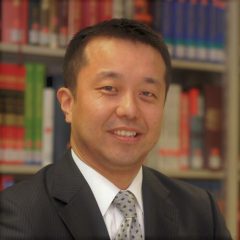
Ryohei Nakagawa
Associate Professor, Faculty of Global Management Studies, The University of Nagano
Nakagawa worked for Bank of Tokyo-Mitsubishi (Tokyo, Kyoto), American International Group (U.S.A.), and World Economic Forum (Switzerland) before teaching at Ritsumeikan and Kyoto University of Foreign Studies. Nakagawa took up his current position as Associate Professor at the University of Nagano in 2020. While lecturing on economics and business administration, Nakagawa has also engaged in planning, preparing, and managing an English curriculum; serving as head of the career center; and serving as director of international affairs among others. Nakagawa graduated from Tokyo University of Foreign Studies majoring in Polish. He also holds Master of International Affairs from Columbia University.

